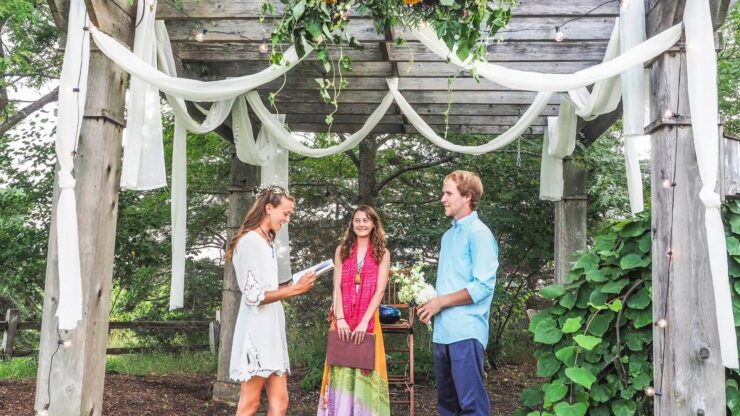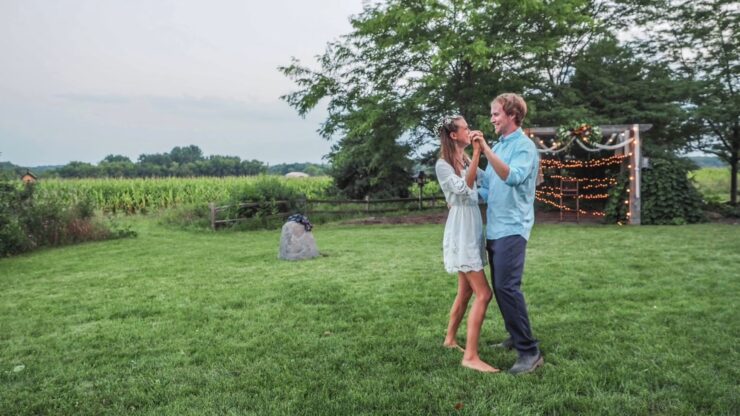Planning a commitment ceremony is an exciting endeavor that allows you to celebrate and publicly declare your commitment to your partner. While the specific details of the ceremony will depend on your preferences, cultural background, and personal style, here is a general guide to help you plan a memorable commitment ceremony:
1. Discuss your vision
Sit down with your partner and have an open discussion about your vision for the commitment ceremony. Consider the tone, theme, and overall atmosphere you want to create. Determine if you want a small intimate gathering or a larger celebration with family and friends.
2. Set a budget
Determine your budget early on to guide your decision-making process. Allocate funds for venue, decorations, attire, invitations, food, entertainment, and any other elements you plan to include.
3. Choose a date and venue

Select a date that works for both you and your partner. Consider the season, weather, and availability of venues. Look for venues that align with your vision, such as a park, beach, garden, or event space. Ensure the venue can accommodate your expected number of guests.
4. Create a guest list
Decide who you want to invite to your commitment ceremony. Consider close family, friends, and loved ones who have been supportive of your relationship. Keep in mind the size of your venue and your budget when finalizing the guest list.
5. Send out invitations
Design and send out invitations that reflect the style and theme of your commitment ceremony. Include important details such as the date, time, venue, dress code (if any), and RSVP information. You can choose to send physical invitations, use online invitation platforms, or create a dedicated event website.
6. Plan the ceremony program
Decide on the structure and flow of the ceremony. Consider including elements such as vows, readings, music, rituals, or symbolic gestures. Personalize the ceremony to reflect your relationship and values. You may want to work with an officiant, celebrant, or a close friend or family member to lead the ceremony.
7. Choose attire
Decide on the attire you and your partner will wear. It can be formal, casual, or based on a specific theme. Ensure that your attire complements the overall style and tone of the ceremony.
8. Decorate the venue

Select decorations that enhance the ambiance and theme of your commitment ceremony. This may include flowers, candles, lighting, signage, and other decorative elements. Consider hiring a professional decorator or enlist the help of friends and family to set up the venue.
9. Plan the reception
If you decide to have a reception, determine the style and format. Choose whether you want a sit-down dinner, buffet, or cocktail-style reception. Organize catering, beverages, and any additional entertainment or activities.
10. Capture the memories
Arrange for a professional photographer or videographer to document your commitment ceremony. You’ll want to cherish these memories for years to come.
11. Organize any additional elements
If you have any additional elements in mind, such as live music, speeches, or special surprises, plan and coordinate them in advance.
12. Rehearse and finalize details
Conduct a rehearsal of the ceremony to ensure a smooth flow. Finalize all details with vendors, confirm RSVPs, and create a timeline for the day.
Pros and Cons of a Commitment Ceremony
A commitment ceremony is a non-legally binding ceremony in which a couple publicly declares their commitment and dedication to each other. It is often seen as an alternative to a traditional wedding ceremony, particularly for couples who are unable or choose not to legally marry. Like any significant decision, there are pros and cons to consider when deciding whether a commitment ceremony is the right choice for you. Let’s explore some of these pros and cons:
Pros of a Commitment Ceremony:
- Personalization: A commitment ceremony allows you to create a unique and personalized celebration that reflects your values, beliefs, and relationship. You have the freedom to design every aspect of the ceremony, including vows, rituals, and readings, without the constraints of legal requirements.
- Flexibility: Since commitment ceremonies are not legally binding, you have more flexibility in terms of location, timing, and format. You can choose a venue that holds special meaning to you, have the ceremony at any time or day, and structure the event to suit your preferences.
- Inclusivity: Commitment ceremonies are inclusive and welcoming to all types of couples, regardless of sexual orientation, gender identity, or cultural backgrounds. It is an opportunity to celebrate love and commitment without any legal barriers or restrictions.
- Symbolic Commitment: For couples who do not wish to marry or are unable to legally marry due to various reasons, a commitment ceremony allows them to publicly declare their commitment to each other. It can serve as a symbolic and meaningful gesture of love and dedication.
- Lower Cost: Commitment ceremonies tend to be more cost-effective compared to traditional weddings. Without the legal paperwork and associated expenses, couples can allocate their budget towards other aspects of the celebration, such as venue, decorations, and entertainment.
Cons of a Commitment Ceremony:

- Lack of Legal Recognition: One of the main drawbacks of a commitment ceremony is that it does not provide legal recognition or benefits. If legal rights, such as tax benefits, inheritance rights, or spousal benefits, are important to you, a commitment ceremony may not fulfill those needs.
- Limited Legal Protections: Unlike legally married couples, couples who have participated in a commitment ceremony may not have access to certain legal protections, such as healthcare decisions, insurance coverage, or immigration benefits. It’s important to consider the legal implications and potential limitations of a commitment ceremony.
- Social Understanding: Commitment ceremonies are not as widely understood or recognized as legal marriages. Some individuals may not fully grasp the significance of a commitment ceremony and may have difficulty comprehending its purpose or meaning.
- Family and Social Pressure: Depending on your cultural or familial background, having a commitment ceremony instead of a wedding may not be accepted or understood by some family members or friends. It’s important to consider how this may affect your relationships and whether you’re comfortable navigating potential social pressure or disapproval.
- Limited Officiant Options: Finding an officiant to perform a commitment ceremony might be more challenging than finding someone authorized to perform legal marriages. Ensure you have a plan in place to secure a suitable officiant who aligns with your beliefs and vision for the ceremony.
Ultimately, the decision to have a commitment ceremony depends on your personal values, circumstances, and desires as a couple. It’s essential to weigh the pros and cons, consider your long-term goals, and discuss your intentions with your partner before making a choice that feels right for both of you

